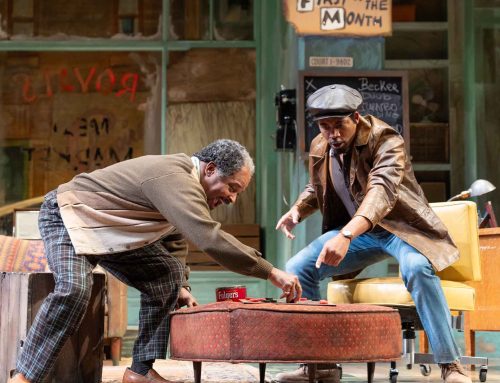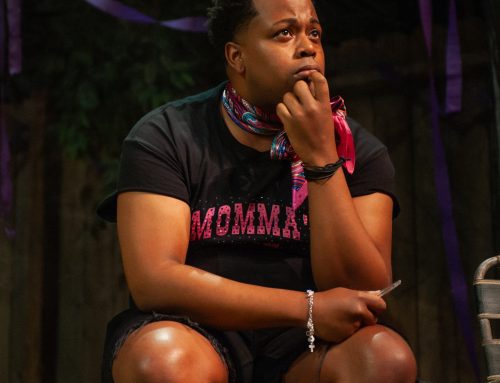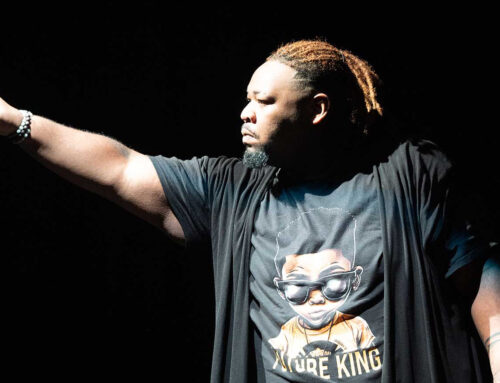at the Oregon Shakespeare Festival

The rhythms, the timing, and method of communication in Death and the King’s Horseman are not familiar or comfortable for a typical American play-goer. But, if you let yourself be absorbed into the opening long, chatty, riddling, market scene — if you let your thoughts fall into the same tempo as the indirect, elaborate, and elegant storytelling dialog — then Death will grab you from the opening curtain… err… more like opening colorful banner… and make you witness an unwanted, unavoidable, and unstoppable tragedy.
This vignette of colonialism is written by Wole Soyinka, a Nigerian, whose native conversational conventions and behaviors are skewed from the linear and logical lines which create traditional Anglo theatre experiences. Death is definitely recognizable as a play, and it follows dramatic rules, but it maintains a feeling of being somehow culturally foreign and richer.
The plot is simple. The tribal king has died and according to custom his Horseman must prepare the way for the king on the other side. One step in fulfilling this duty is for the Horseman (Derrick Lee Weeden) to end his time on this side by killing himself. The low-level English District officer (Rex Young) prevents the Horseman from carrying out this “barbaric” suicide.
The play and the production are anything but simple. A village springs up around the story outline. Intricate language and complex relationships move the characters obliquely toward the inevitable and obvious bad end. It is the words, the pageantry, and the moral murkiness that provide the substance of the evening.
The closeness, the tribal-ness, the authenticity of the native Africans is communicated relentlessly through drumbeats, language, color, body movement, tone, and dance, dance, dance. Director Chuck Smith has inspired a set, costumes, lighting, and cast that are an organic and integrated tool for tale telling. After watching too many performances at OSF recently where the director has had no credible vision, Smith’s whole world creation is an incredible relief and welcome.
Weeden’s strong Horseman provides the most direct focus for what’s going on in the surface story. He is a beacon for the part of the audience which is initially lost in the early marketplace chatter — the Horseman’s actions are understandable and Weeden is a master: he looks and feels like the leading man. His switches from swagger to ceremony to doom are brilliant both in ability and in the way they light up the play’s path on stage.
Weeden’s Horseman is the title character and he is on stage for most of the performance. Yet this is not his story. He is created by and is a function of the village which is most immediately represented on stage by the Praise-Singer (G. Valmont Thomas) and lyoloja (capitalization as per the Playbill), the mother of the market, (Perri Gaffney).
In fact, when considering Death’s narrative, my mind’s first flashback is to the Praise-Singer . It is he who at the beginning of the play gives voice and body to the traditional story of the Horseman. He reappears throughout Death to reinforce the tradition, to nag, or to decry deviations from the cultural imperative. In this role, Thomas is amazing. Forceful, nuanced, stylized, and direct in a rotating blur of perfect characterization. He doesn’t just act as the Praise-Singer, he steps up to the duties of the village Praise-Singer and executes them faithfully.
Gaffney wastes no movement. She calculates, defers, and judges with subtlety and gestures as much as with her direct and detailed language. Her control is an exquisite counterpoint to her function as chief dancer and physical mover of the flowing marketplace women.
Together the Praise-Singer and lyaloja bracket the King’s Horsemen. The two lay out the Horseman’s path, foresee his missteps, and deal with the fall out.
Behind the three main characters, the additional members of the village are strong, if occasionally over-stereotypical in scenes with white people. The drummers (Adebisi Adeleke, Ryan Mehlmauer Camara, and Kevin Underwood) skillfully set the mood and pace for many scenes. The marketplace girls (Khatt Taylor, Krystel Lucas, and Arsene DeLay) weave life into the village with their movement and dancing — there would be no village without their magic.
Sgt. Amusa (Kevin Kenerly), the houseboy (Tyrone Wilson), and Olunde (Ryan Anderson) are better than competent in their supporting roles. Anderson deserves particular credit for appearing late in the play and providing a conflicted bridge between the opposing sides. The pace and tone of each culture had been established when Anderson walked on, and yet he carved out a third way that felt natural.
The play’s and production’s flaw is the pastiness of its white people. They are written without depth, especially the District Officer (Rex Young). Young’s portrayal worsens this weakness with his almost comic backing off when the Horseman advances in verbal argument. Young scores a perfect 10 in insensitive, simpering cluelessness, and this characterization makes the play feel too one-sided. James Edmondson plays the white Resident character lower-key and with more style, even though the character’s lines are simplistically foppish. Perhaps if Young followed Edmondson’s styling and was less of a cartoon, the obvious stupidity of the white man would have been less blatant and the message of Death would have been stronger.
There’s a strong correlation between people’s feelings toward Death and their feelings toward last year’s foreign The Clay Cart. While Clay Cart was light and Death is a message tragedy, the delay in entering the world of the play can be the same. Several friends warned us not to leave after the first act of Death because it “gets better”, a warning that puzzled me since I was involved from the start. My guess is that the riddles and stories of the marketplace just don’t resonate as part of a play for a lot of us.
Death and the King’s Horseman is another “only at OSF” production, and that’s said in a good way. The work is from another culture and another mind set. OSF has created an intelligent, quality, and consistent interpretation. The result is much more than a night at the theatre that is “good for you”. It’s a perspective-widening night at the theater which you will chew over and linger over for a long time.
Ozdachs Rating: ![]()





Leave A Comment